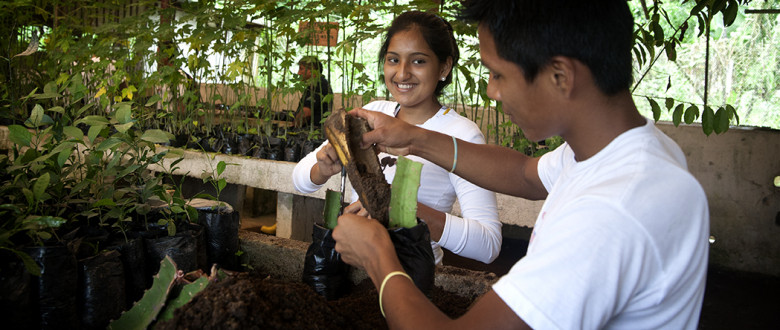
Since his appointment as Minister of Education in May, Fander Falconí has made the prevention of violence in and around schools a national priority. VVOB Ecuador is providing technical assistance.
Violence in and around schools is a serious issue in Ecuador. According to data of the Ministry of Education, almost 6 out of 10 children have suffered some form of violence in school. As is the case in much of Latin America, school violence in Ecuador has commonly been framed as a product of youth gangs involved with guns and drugs.
But the phenomenon is more complex. For instance, the prevalence of sexual and other forms of gender-based violence in and around schools has become increasingly palpable following a number of highly mediatised cases earlier this year. The majority of victims are between 15 and 17 years old. The new Minister of Education is determined to address the matter.
A clear message
There is a suspicion – perhaps in part because of the mediatisation – that sexual violence against minors in institutions such as schools is widespread. But it is difficult to get a hold of precise data. Until recently sexual violence in and around Ecuadorian schools remained shrouded in a culture of silence. It is indicative that of the 152 cases that were reported in 2015, only 24 were denounced by head teachers or district directors.
To break this pattern, Fander Falconí is sending a clear message, calling on all educators to take an ethical stance against all forms of violence: “We must share the same vision. The vision of the Ministry of Education is that we can have zero tolerance when it comes to these acts or any that are a violation of the rights of our children and adolescents. As educators and as education authorities, we cannot remain unalarmed in these situations. I demand an ethical stance from you.”
Swift action to implement a rights-based approach
The Ministry of Education has launched a National Plan of Harmonious Coexistence and a Culture of Peace in Schools (Plan Nacional de Convivencia Armónica y Cultura de Paz en el Espacio Escolar) and is actively promoting the guidelines and protocols on how to address violence in schools that were developed together with VVOB (here). A first, these guidelines advocate for an inclusive rights-based approach.
The Ministry explicitly warrants the right to education free from violence for all and with respect for diversity, including in terms of sexual orientation and gender identity. It speaks to the government’s policy commitment that VVOB has now been invited to co-develop an accompanying guide on preventing and addressing violence against LGBTI persons (Guía de prevención y actuación frente a situaciones de violencia contra personas LGBTI).
Getting educators on board
Hand in hand with the introduction of these new guidelines, the Ministry and VVOB are implementing an awareness training and capacity development trajectory for Ecuador’s student counsellors or representatives of the Departamentos de Consejería Estudiantil (DECE). As of now, the Ministry has appointed 954 DECE to schools with more than 1,000 students and their number is set to increase over the coming months. Besides working directly with students, the DECE also provide crucial support to other colleagues at school.
DECE help head teachers with the development of a school-wide ‘Plan of Harmonious Coexistence’ and they work with teachers to ensure they can apply concrete methodologies to prevent and address violence in the classroom.
Restorative practices
On the prevention side, one of the methodologies integrated in the capacity development trajectory for DECE is the use of restorative practices, shifting away from (strictly) punishment-oriented thinking. Restorative practices are a framework for building community and for responding to challenging – even violent – behaviour through authentic dialogue, coming to understanding, and making things right. Teachers who use these methods often find that the overall proportion of time dedicated to managing behaviour is reduced. This means more instructional time becomes available. It also means that students (and teachers) have happier, more peaceful experiences of their school days.
Backed by a motivated Minister of Education, policies to address school-related gender-based violence can effectively be developed in consultation with all educators.




